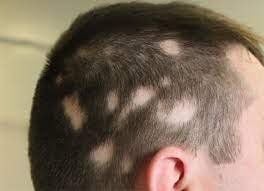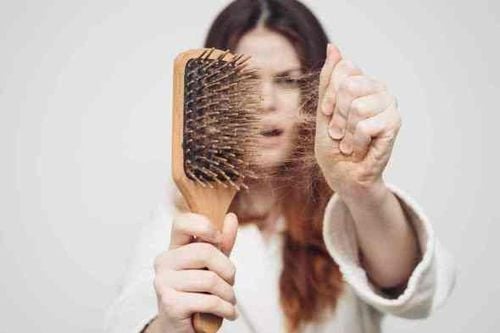Hair loss on the body can happen due to many reasons. However, if it is not detected early, it may pose a risk to health. Below are some common causes of body hair loss.
1. Hormonal imbalance
Hair loss or hair thinning may indicate that you have polycystic ovary syndrome (PCOS). This is a serious condition caused by hormonal changes, which can affect women’s health. PCOS may also lead to excessive hair growth in the pubic area. Sometimes, due to hormones, hair can grow thickly in areas that do not have a specific function or do not need protection.
In men, hormonal effects can cause hair growth on the chest or chin. Some may experience excessive hair growth on their legs, arms, or even on their fingers. This is considered to be influenced by male hormones. In some cases, hair growth in certain private areas in men is seen as a characteristic or a way to differentiate between genders.
2. Hair loss due to autoimmune disorders
Patchy hair loss or failure to regrow hair can occur when the immune system attacks the body, damaging hair follicles and preventing them from developing. Affected areas may remain bald for a long time, particularly on the scalp. Hair loss can also affect the eyebrows, eyelashes, or lead to widespread body hair loss.
This is considered a common type of hair loss. However, if it involves scalp hair, you can consult a doctor to explore treatment options. Even though hair follicles may have reduced function, they can still be nourished and treated medically to stimulate hair regrowth as before.

3. Thyroid conditions causing hair loss
If you notice hair loss along with symptoms such as fatigue, muscle weakness, dry skin, or sudden weight gain, inform your doctor. These signs may indicate a thyroid issue. In this case, you may be prescribed medication to help stabilize thyroid function.
For hair loss caused by thyroid problems, treatment may take several months. There is no need to worry excessively about thyroid medications causing hair loss, as this is very rare. However, if you happen to experience this side effect, inform your doctor as soon as possible.
4. Diabetes and hair loss
Type 2 diabetes occurs when blood sugar levels exceed the body’s normal range. With diabetes, hair follicle cells may become damaged or lose their normal function. This issue often arises after being diagnosed with or showing signs of diabetes.
When you have diabetes, your hair may gradually thin due to excessive hair loss or take longer to regrow. Hair loss may become more noticeable over time if blood circulation is not improved. You can consult a doctor to manage blood sugar levels and develop an appropriate treatment plan if needed.

5. Hair loss due to genetic factors
You may have inherited issues affecting normal hair growth from birth. This theory has attracted significant attention from researchers and has been tested in various studies. If newborns show thin, sparse, or easily breakable hair, it may be linked to genetic disorders.
Hair loss caused by genetics may persist and continue without stopping into adulthood. Additionally, you might face the risk of affected areas where hair either does not grow or grows very slowly.
6. Adrenal gland disorders
In Addison’s disease, the adrenal glands cannot produce enough hormones to meet the body’s needs, including cortisol and aldosterone. This is one of the reasons for body hair loss and pubic hair loss, which can lead to difficulties in women’s intimate life.
When affected by this disease, you may experience constant fatigue, exhaustion, skin discoloration, and stomach problems. If you notice these symptoms and suspect Addison’s disease, consult a doctor immediately. While the condition can be treated with medication, ignoring it can lead to life-threatening complications.
7. Hair loss caused by sexually transmitted infections (STIs)
Certain sexually transmitted infections can cause hair loss. In particular, during the later stages of syphilis, you may experience patchy hair loss. Other symptoms include fever, sore throat, or a rash that does not itch. It is crucial to use prescribed medication to treat STIs and protect your overall health.
Treatment can only help reduce the effects of the disease but may not completely eliminate it from your body. Even with effective treatment, syphilis can still cause damage to the eyes, heart, and brain. To minimize the risk of contracting STIs, always remember to use condoms to prevent transmission.

8. Iron deficiency and hair loss
Iron deficiency anemia can be a cause of hair loss. When your body lacks proper nutrition, hair roots become weak, leading to dryness, breakage, and hair loss. For this reason, doctors often check iron levels in the body as an initial step in diagnosing the cause of hair loss.
Once tests confirm anemia or iron deficiency, doctors will provide tailored advice. Common solutions include increasing iron-rich foods in your diet, such as meat, beans, and leafy greens. If your body has difficulty absorbing iron, your doctor may prescribe medication or recommend suitable supplements.
9. Nutritional deficiencies in daily diet
Iron is just one of many essential nutrients that help keep hair strong and healthy. To maintain healthy and functional hair follicles, it is important to ensure your daily diet provides enough vitamins and minerals. Poor eating habits or difficulty absorbing nutrients can lead to prolonged hair loss.
To check for nutritional deficiencies, your doctor may perform laboratory tests. You might be advised to increase your intake of protein-rich foods and vitamin D to improve your condition. However, further research is needed to determine the precise role of these nutrients in preventing hair loss.
10. Excess vitamin A and selenium
While it is important to supplement vitamins and minerals when experiencing hair loss, excess levels of certain nutrients can harm your health. Studies show that excessive vitamin A and selenium intake can increase the risk of hair loss.

11. Excessive stress
Frequent exposure to life’s pressures can weaken your immune system. This is another reason hair follicles may lose their function, leading to gradual hair loss that often goes unnoticed until it becomes severe.
Stress can be as harmful as autoimmune conditions. Sometimes, hair loss may stem from psychological behaviors. Research indicates that habits like pulling out hair are common in individuals with mental health disorders. Excessive hair-pulling can prevent regrowth in those areas, resulting in baldness.
12. Scarring alopecia
Inflammatory conditions can weaken hair follicles, leading to patchy hair loss. You may notice that scarred areas tend to be thicker than normal skin and undergo changes that make it very difficult for hair or body hair to grow back. These conditions can significantly impact appearance.
Studies suggest that inflammatory disorders are a common cause of hair loss. Therefore, identifying the cause and seeking early treatment is essential to give the affected area a chance for regrowth.
The above are some reasons for body hair loss for your reference. If you notice any of these symptoms, visit a healthcare facility promptly for advice and early treatment.
Visit the website: Vinmec.com regularly to update more useful information.
To arrange an appointment, please call HOTLINE or make your reservation directly HERE. You may also download the MyVinmec app to schedule appointments faster and manage your reservations more conveniently.
Reference article: webmd.com
To arrange an appointment, please call HOTLINE or make your reservation directly HERE. You may also download the MyVinmec app to schedule appointments faster and manage your reservations more conveniently.








